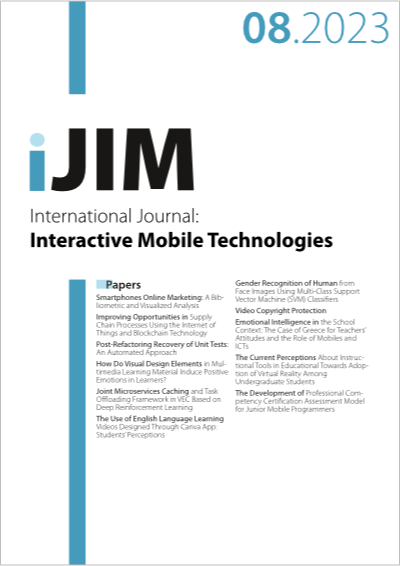Gender Recognition of Human from Face Images Using Multi-Class Support Vector Machine (SVM) Classifiers
DOI:
https://doi.org/10.3991/ijim.v17i08.39163Keywords:
Gender recognition, Gabor, HOG, SURF, SVMAbstract
In the realm of robotics and interactive systems, gender recognition is a crucial problem. Considering the several uses it has in security, web search, human-computer interactions, etc., gender recognition from facial photos has garnered a lot of attention. The need to use and enhance gender recognition techniques is felt more strongly today due to a significant development in the design of facial recognition systems. Relatively speaking to other approaches, the progress gained in this area thus far is not exceptional. Thus, a novel method has been adopted in this study to improve accuracy in comparison to earlier research. To create the best rate of accuracy and efficiency in the suggested method of this research, we choose a minimal set of characteristics. Testing on the FERET and UTK-Face datasets reveals that our suggested algorithm has a lower degree of inaccuracy. In this article, the input image of the person's face is pre-processed to extract the right features from the face once the person's face has been recognized. Gender separation is achieved using Multi-class Support Vector Machine (SVM) Classifiers after features from normalized images have been extracted using Histogram Oriented Gradient (HOG), Gabor Filters, and Speeded Up Robust Features (SURF), as well as their combination to select the most appropriate feature from them as input for gender classification. As a feature reduction feature, the Principal Component Analysis (PCA) algorithm is also employed. Using the proposed approach, 98.75% gender recognition precision has been accomplished on the FERET database and a runtime performance of 0.4 Sec. on the UTK-Face database, 97.43% gender recognition accuracy has been accomplished and a runtime performance of 0.5 Sec.
Downloads
Published
How to Cite
Issue
Section
License
Copyright (c) 2023 Haider TH.Salim ALRikabi, Mohammed Jawad Al_Dujaili, ,Nisreen Khalil abed, Ibtihal Razaq Niama ALRubeei

This work is licensed under a Creative Commons Attribution 4.0 International License.



